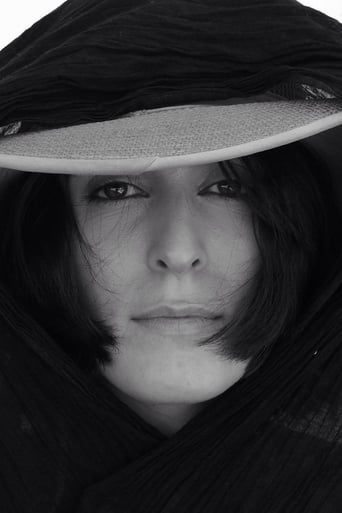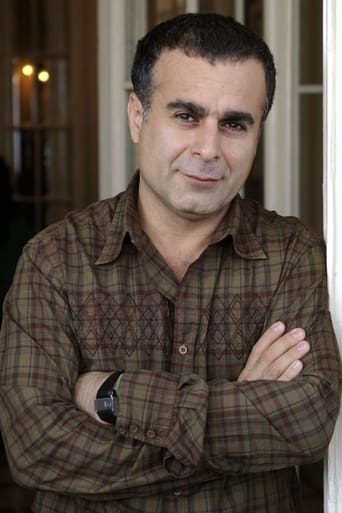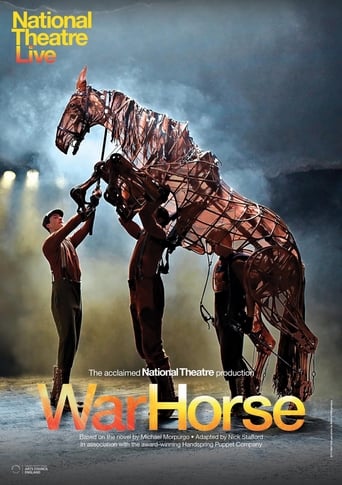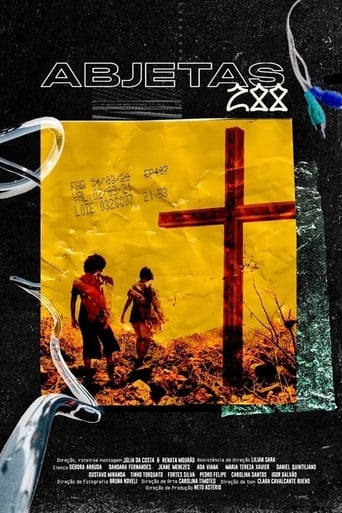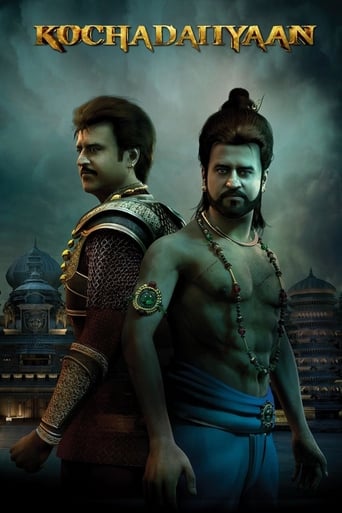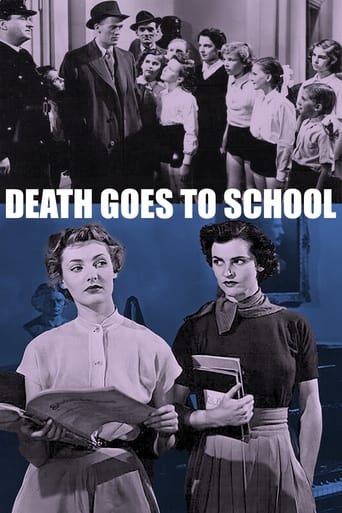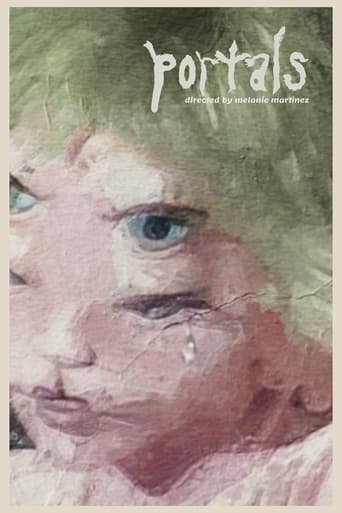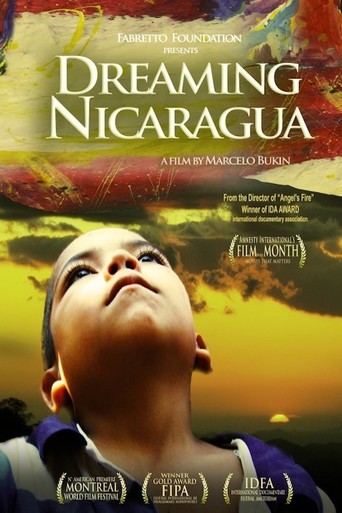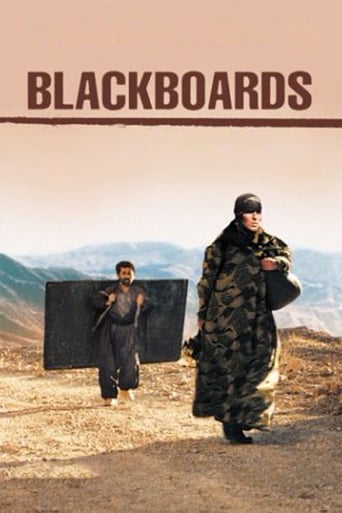
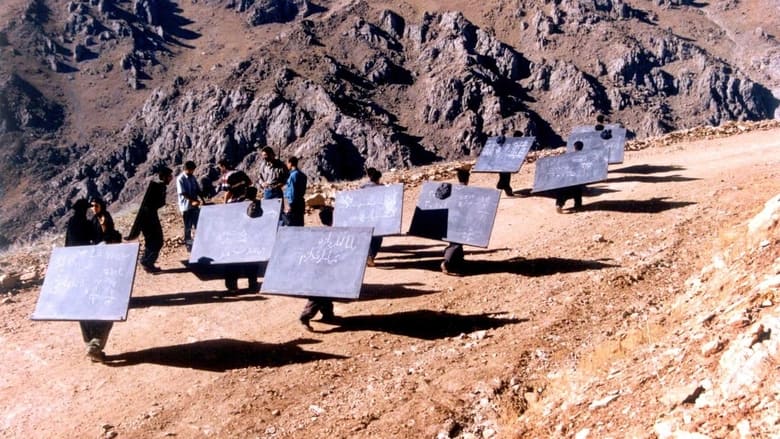
Blackboards (2000)
Itinerant Kurdish teachers, carrying blackboards on their backs, look for students in the hills and villages of Iran, near the Iraqi border during the Iran-Iraq war. Said falls in with a group of old men looking for their bombed-out village; he offers to guide them, and takes as his wife Halaleh, the clan's lone woman, a widow with a young son. Reeboir attaches himself to a dozen pre-teen boys weighed down by contraband they carry across the border; they're mules, always on the move. Said and Reeboir try to teach as their potential students keep walking. Danger is close; armed soldiers patrol the skies, the roads, and the border. Is there a role for a teacher? Is there hope?
Watch Trailer
Cast
Similar titles
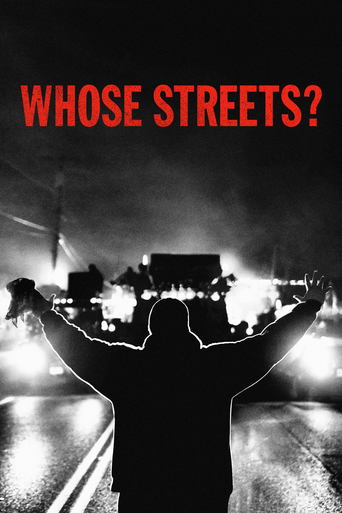
Reviews
How sad is this?
This story has more twists and turns than a second-rate soap opera.
Strong acting helps the film overcome an uncertain premise and create characters that hold our attention absolutely.
All of these films share one commonality, that being a kind of emotional center that humanizes a cast of monsters.
This film promised to be a real sleeper. I am a teacher and knew I'd enjoy a movie about traveling teachers who carry blackboards on their backs. But the teachers split up and of the ten or so that start out, the camera picks the worst example of a teacher to follow. You don't realize this at first--you see him laboriously searching students with an interest in reading. What he finds is a group of child smugglers or mules and an exodus of old folks returning to Iraq. None have the inclination to learn to read even if the lessons are free. They're too busy and too tired. But Said, the teacher we're following, doesn't hear a word they say. The audience is in awe at the all-work lifestyle of these kids who only want to survive. Said keeps asking them if they want to read clearly not even hearing their responses.Later he marries as a favor to a stranger whose friend is old and wants to see his daughter married off. Said promptly starts to teach her to read ignoring the fact that she could care less. He sends the kid off so he can pepper her with letters of the alphabet that she simply ignores. Later, his stepson runs off and the wife heads down the road in pursuit. Said thinks she's deserting him. He never does get why she went down the road or why she finally stops. She's found the kid but Said is clueless as to what has just happened. So he divorces her for being weird.He was the worst ambassador for being literate that I've ever seen. In spite of him I was moved by the poverty, the hard dry terrain, and by the bravery and loyalty of the people who marched all day seemingly without food or water.
This is a rather well made movie, that shows some of the problems in Iran that affects its poor northern citizens, without luckily ever getting over-dramatic or too sentimental but at the same time it's also lacking in true depth to make this a powerful or impressive movie.It's a slow moving movie that is entirely filmed with handhold camera, with lots of long sequences. It works good for a realism and the atmosphere of the whole movie but at the same time means that this is not a movie for just everyone. You must be able to handle the slow- and different way of storytelling to appreciate this movie fully.The movie is good looking, with its moody, never-ending, landscapes and good camera positions to tell the story with. The dialog is realistic, though not always interesting. I mean they basically say the same things five times in a row in this movie, which perhaps is a bit irritating. This is also due to the non-professional actors that play in this movie. Needless to say that not everything works out fully in this movie, especially when it comes down to the true emotion or depth of the movie. Lucklily there is no lack of realism, although the movie its story pushes it at times. But on the other hand it's the story that still makes this a pleasant movie to watch. The subject might be heavy and serious but luckily the movie doesn't try to emphasis this. The end result is a good and not heavy to watch movie that is absolutely worth seeing but lacking in real emotions or depth to make a true lasting impression.The movie is told from an original point of view; A couple of schoolteachers that travel trough the North of the country to remote villages and groups of refugees, to teach them the basic things such as writing, reading and simple math, to try and give everyone a better future and at the same time earn some money or get some free food as well. They're mixed up in all the difficulties but yet they're no part of it. If they want they can walk away from all the troubles if they choose to. They're objective in the whole situation and they don't do more than is ever asked of them.Most of the characters in this movie are being played by non-actors. It works realistic but at the same time is one of the reasons why the movie is lacking in any true depth or well acted out emotions. The movie as a whole is effective and it makes its point well but it does so without ever impressing too much, with the exception of one or two great sequences.Samira Makhmalbaf has some good and promising potential as a filmmaker and is possible future Oscar potential, just like her father, who also co-wrote this movie but her movies have to become even more confronting and daring if she wants to achieve that.7/10http://bobafett1138.blogspot.com/
I have nothing against slow movies -- for instance kiarostami is a huge favorite of mine. But I have to admit, this film really pushes the slow-and-obtuse envelope. it's mainly the script. the teachers encounter various nomads and desperately harangue them to hire them as teachers... when people refuse, they just repeat themselves again and again, and it seems that nobody really listens to anyone else. it's a study in harshness. it leans heavily on symbolism, and you feel that the whole thing is totally constructed by the filmmaker, that no respect at all is being paid to naturalism or the kinds of reactions that people would likely have in a situation like this. so, if you're really excited by a symbol-filled, quite stark time, you will appreciate this. I wasn't up for it.
BLACKBOARDS is a human story - an arduous one at that. It affirms the tenacity of human spirits. Its hard medicine content could be uneasy for some to bear. At its core, there is warmth a-glowing beneath it all. Writer-director Samira Makhmalbaf is a true artist - she included subtle visual poetic accents. Shooting along the rugged terrain of Kurdistan, nearing the border between Iran and Iraq, it's barren of vegetation, full of treacherous rocks as people traverse the steep mountain paths and windy troughs. I really appreciate a particular detail scene: from the held wide-shot of a group of teachers with blackboards strapped to their backs, standing abreast at a mountain road clearing - paused, camera quietly cuts to a close-up of a pair of feet with 'billowing' fabric of the trousers. We need no sound effect of whistling wind, the shot was at once poetic and effective. How succinct and direct in expressing the moment, Samira did. For a 20-year old woman Iranian director in her second feature film, Samira Makhmalbaf is awesome - sensitive, perceptive, mature in her viewpoint, with bold persistence against all odds to complete her project. Keen awareness of the state of affairs her film is focused on - not so much as making a political statement, she's more in earnest depicting simple everyday things: the mundane human needs of the wandering Nomads yearning to be home; the young 'mule' boys struggling for meager living yet looking out for each other; teachers seeking pupils in exchange for food. It's philosophical: through the course of the journey, the fate of the blackboards goes through transitions as situations demand - even "let go." Survival and adaptability co-exist.Samira has a good mentor - her father Mohsen Makhmalbaf, who is a collaborator on the writing of "Blackboards" and her first feature, "Apple, The" 1998 (a bold unique storytelling in docu-drama format). She also has the expert assistance of cinematographer Ebrahim Ghafori, who previously worked with her on "Apple." Bahman Ghobadi is the actor who portrayed the teacher who ran into the expedition of the young 'mule' boys with contraband goods on their backs. He was the writer-director-producer of the film "A Time for Drunken Horses" 2000, and here in "Blackboards," it's déjà vu - this time is not of snowy setting, but included brief dramatic storyline between him and the boys. Reality is still bitter truth, but Samira kept the element of humanity intact. Other efforts from the Makhmalbaf family include: "Day I Became A Woman, The" 2000 by Marzieh Meshkini, Mohsen's wife. "How Samira Made the Blackboards" (it'd be interesting to see how Samira shot the film in such arduous circumstances and with mostly non-professional cast with wide age differences) by Mezssam Makhmalbaf, Samira's brother. Father Mohsen Makhmalbaf did "Gabbeh" 1996 and "Kandahar" 2001.More Iranian films? Try writer-director Majid Majidi's "Baran" 2001 - a poignant story about a young man (17-year old) in Tehran, how he matures through his deeds in trying to help an illegal Afghan of a poor family - it's a rich human story from the filmmaker who gave us "Color of Paradise" 2000 and "Children of Heaven" 1999.
